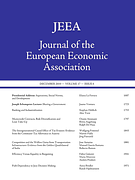Quantifying the unemployment effects of Trump’s protectionist policies
voxeu.org
November 13, 2019

Carrère C., Anja Grujovic A., Robert-Nicoud F. (2020), "Trade and Frictional Unemployment in the Global Economy", Journal of the European Economic Association, jvz074,